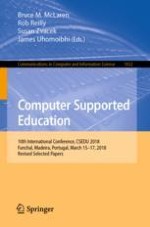2019 | OriginalPaper | Buchkapitel
Algorithms and Logic as Programming Primers
verfasst von : Pia Niemelä, Antti Valmari, Simo Ali-Löytty
Erschienen in: Computer Supported Education
Aktivieren Sie unsere intelligente Suche, um passende Fachinhalte oder Patente zu finden.
Wählen Sie Textabschnitte aus um mit Künstlicher Intelligenz passenden Patente zu finden. powered by
Markieren Sie Textabschnitte, um KI-gestützt weitere passende Inhalte zu finden. powered by
